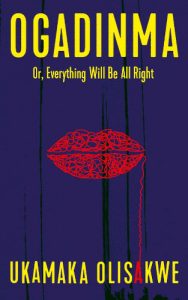Shayera Dark reviews Ogadinma: Or, Everything Will Be All Right by Ukamaka Olisakwe.

Ogadinma: Or, Everything Will Be All Right
Ukamaka Olisakwe
The Indigo Press, 2021
Ogadinma: Or, Everything Will Be All Right follows the life of the titular teenage protagonist, Ogadinma, as she tries to still herself against a buffeting tide of societal expectations. Set in the Nigerian cities of Kano and Lagos, just before and during the military rule of Muhammadu Buhari in the nineteen-eighties, Ukamaka Olisakwe’s novel deftly interconnects public violence with that which occurs behind closed doors.
During the course of the novel, Ogadinma’s father allows his obsession with family honour to damage their once close relationship, and later, her much older husband, Tobe, finds every opportunity to blame his self-inflicted misfortunes on her, often with recourse to physical violence. The backdrop of the military’s infantilisation and brutalisation of civilians becomes a macrocosm of the vicious abuse Ogadinma endures at the hands of her family.
The novel opens with a naive seventeen-year-old Ogadinma in the office of a barrister, who she and her father believe can help her gain admission into one of Nigeria’s top universities. The man treats her dismissively, until, sensing her desperation, he decides to take advantage of the imbalance of power between them, a situation that will be all too familiar to the reader in the post-#MeToo era. While Ogadinma doesn’t explicitly refuse the barrister’s advances, see believes that his promise of securing her a spot at university, via his brother, leaves her no choice but to reluctantly give in to his repeated sexual demands. Of course, his assurance of a university place ultimately bears no fruit, and Olisakwe pointedly shatters the insidious but oft-repeated myth that women sleep their way to success, while strongly suggesting that the opprobrium usually directed at women forced into positions such as Ogadinma’s should perhaps instead be directed towards those who abuse their power, preying on the vulnerable.
Ogadinma discovers she is pregnant, and after weighing up the threat to her education and the stigma associated with having a child while unmarried, decides to terminate the pregnancy, illegally, with money the barrister gives her to ‘take care of yourself’. But she suffers complications that land her in hospital and lead to her father finding out about the procedure. With the family’s reputation at stake, Ogadinma is parcelled off to her father’s brother’s house in Lagos. She is unaware of the true motivation behind her father’s decision until Tobe, her uncle’s wife’s brother, proposes marriage to her, following a brief, vaguely defined courtship.
In the weeks leading up to the wedding, red flags signaling Tobe’s controlling behaviour emerge, foreshadowing the mould Ogadinma will need to fit into to stay on his good side. ‘Be a virtuous wife,’ advises her uncle’s match-making wife, ‘and you will enjoy him well-well.’ Thanks to her sheltered upbringing in Kano, the older woman fancies Ogadinma a suitably amenable partner for her brother, unlike those Lagos girls who, in her opinion, are wild, opinionated and disagreeable.
The gaping age difference between Ogadinma and the worldly, thirty-five-year-old Tobe marks another manifestation of patriarchal control, one that men exploit to minimise the kind of opposition more experienced women are likely to mount when negotiating boundaries in a relationship. For instance, without prior discussion, the now-engaged Ogadinma finds herself regularly ferried to Tobe’s house to cook his meals, and when Tobe rebukes her for turning down a date, she wishes she were as assertive as her cousin. Ifeoma has no qualms leaving the cooking to her mother and brother: ‘Ifeoma didn’t have to seek anyone’s permission before she laughed, before she did anything at all.’
In Nigeria, as in many countries, marriage is still seen as an achievement, by men and women alike, but the onus of maintaining the relationship weighs heavily on the latter. Women are the target demographic for the relationship self-help industry, are more likely to suffer slights about their inability to ‘keep a man’, and face the stigma of divorce much more than their male counterparts. It is the pressure to conform to the image of the ideal wife that, as Olisakwe noted in a piece for the International Writing Program, drives Nigerian women to ‘shed our former identities and cling to the man’s for relevance’. Even for those brave enough to break free and reclaim their lives, external forces stand ready to keep them confined, as Ogadinma’s father does after Tobe physically assaults her: ‘You think you have endured what others haven’t?’ he asks upon her return to Kano. ‘You must forgive him. Do you understand me?’
She receives a similar response from her aunt following another violent assault at her husband’s hand that sends her to the hospital:
‘What happened has happened, and it will not happen again. But it’s not the reason you will be squeezing your face all the time’.
Many women in abusive relationships are expected to carry the blame for their abuser’s reprehensible conduct, a sad reality reflected in the ubiquity of the question What did she do to him? rather than Why would he do that to her? This attitude, the belief that women are the instigators of unrestrained male rage, signals the wide acceptance of domestic abuse as a fact of married life in many parts of society. It is, as Ogadinma’s aunt plainly puts it, ‘the burden women have to bear’.
But to whose benefit? Certainly not society’s.
Ogadinma: Or Everything Will Be All Right succeeds in delineating the many faces of sexism, including internalised misogyny, through the women in Ogadinma’s life, who all impede her from breaking free. This is succinctly captured in a conversation between her and her paternal grandmother:
‘You know what your mother’s problem was? She was too ambitious. She wanted to do everything in the world as though she was a man, reducing my son to the wife, and it did not work.’
Essentially, Ogadinma’s mother didn’t fit into what Nigerians call ‘wife material’, a woman willing to suppress her aspirations, opinions and identity to coddle her husband’s ego and feed his ambitions.
Another aspect central to understanding the gender norms Olisakwe puts under the microscope in the novel is the enduring idea that men are natural leaders and women perpetual subordinates, incomplete until a man becomes the focal point of their lives. The successful hairdresser whom Ogandinma secretly criticises for insisting on her marital status does so because it garners the respect that evaded her as a single woman despite her accomplishments: ‘So, she got herself a small boy, married him and took his name, and now wants everyone to call her madam.’ In another sublime show of everyday sexism, a man yells at two women in a restaurant for making a noise, a behaviour he would not dare display towards other men.
Olisakwe’s novel sits comfortably among contemporary feminist fiction that depicts Nigeria’s negative attitude towards women and the ways women are able to defy oppressive gender norms within marriage, such as Ayọ̀bámi Adébáyọ̀’s Stay With Me or Lola Shoneyin’s The Secret Lives of Baba Segi’s Wives. Characters are loving one minute and vicious the next. Tobe professes genuine love for Ogadinma despite being the source of her pain. With easy, contained prose and layers of grey that shun caricature, the author demonstrates that humans are vessels of conflicting attitudes modulated by contexts, moods and individual relationships.
Like many who have reached a fork in the road, Ogadinma must decide whether to grit her teeth and uphold societal standards, or take the less travelled course, beyond the riverbend, to appease her heart.
- Shayera Dark is a writer whose work has appeared in publications that include LitHub, Harper’s Magazine, Al Jazeera, AFREADA, The Kalahari Review and CNN.





